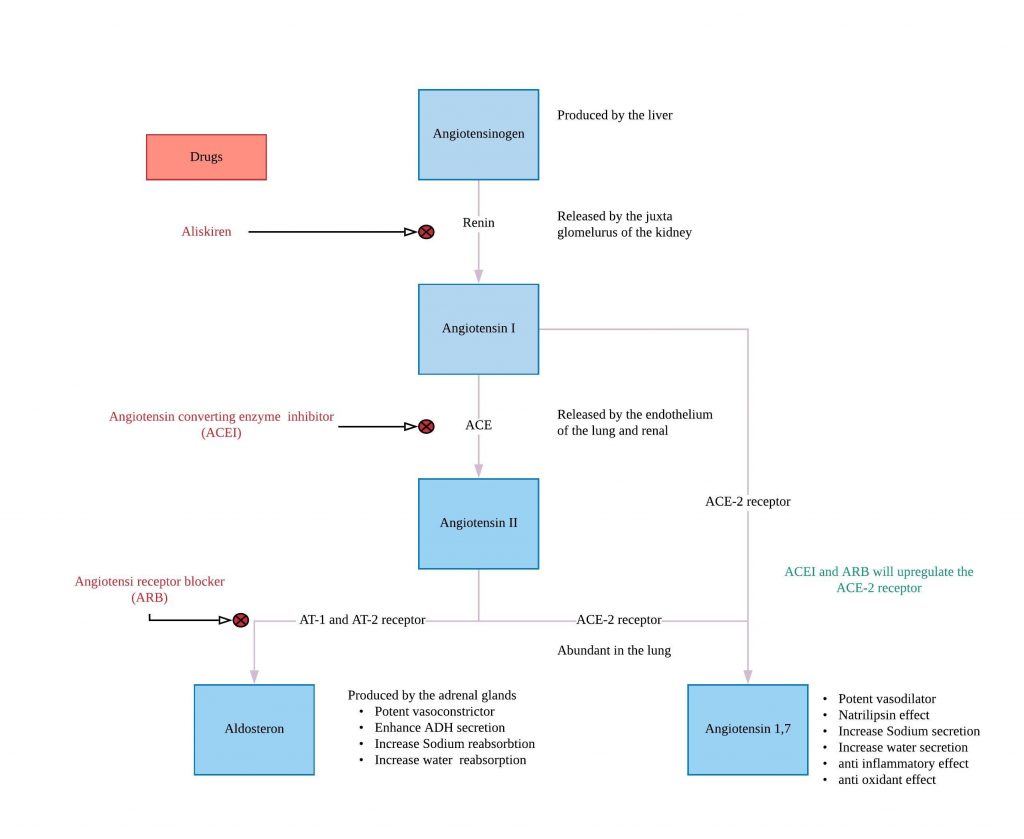To start or to stop

(By Dr Nizam)
Today, I am going to talk about a controversy in COVID 19. If we look at the case mortality rate in Malaysia, 70% of the decease were patients with a history of hypertension, diabetes mellitus, and also heart failure. Those finding were very consistent with one study, which was done in China and published in The Lancet. The majority of those patients are on angiotensin-converting enzyme inhibitor (ACEI) and angiotensin receptor blocker (ARB) drugs because these drugs are the first-line medication for cardiovascular diseases. Base on the study, the author suggested stopping ACE inhibitors and also ARB to patients who are taking these drugs.
Both ACEI and ARB may interfere with the renin-angiotensin-aldosterone system (RAAS) and are called a RAAS inhibitor. RAAS is essential in cardiovascular regulation, where it controls the vasodilation, venodilation, and even the blood pressure. Examples of the ACEI drugs are Perindopril, Captopril, Enalapril, and Lisinopril, and the ARB drugs are such as Irbesartan, Candesartan, Valsartan, and Telmisartan.
A little on the physiology. Aldosterone is the end product of RAAS regulation. Aldosterone is a very potent vasoconstriction. It will increase the total peripheral resistance and increase the blood pressure. It also has natriuretic effect where it will increase the absorption of sodium in the kidneys. When sodium is absorbed, it will attract water to be incorporated together. As a result, it will increase the venous return and increase the cardiac output and increase the blood pressure. It is vital to maintain the blood pressure.
For a patient who has hypertension, by inhibiting the aldosterone, the effect will be vice versa; the blood pressure will be better. These drugs are also used in the management of diabetes mellitus, especially to reduce the diabetic proteinuria by dilating the efferent arterial in the nephron and reducing the intra-glomeruli hypertension. For congestive heart failure, these drugs have the action to reduce the preload and afterload effect.
As I mentioned before, coronavirus enters the host cell by binding its S spike to the specific host receptor, which is called Angiotensin Converting Enzyme 2 (ACE2) receptor. The function of the ACE2 receptor is to activate the ACE 2 enzyme and later, to convert the Angiotensin II to angiotensin 1-7. Angiotensin 1-7 has a vital role in the regulation of the cardiovascular system. It acts as a neprilysin hormone, which can induce natriuresis and, therefore, reduce the afterload. It also has a potent vasodilator effect, which automatically able to reduce preload. It also has an anti-inflammatory property and even an anti-oxidant effect. Since it can reduce the preload and afterload, it is a superb hormone for the cardiovascular system.
Two very potent antihypertensive drugs, which are called RAAS blockers, will promote the above effect. At the same time, it also induced the up-regulation of the ACE2 receptor to enhance the effect. Because of superb action on the cardiovascular system, RAAS blockers have become the first-line treatment for patients with hypertension, diabetes mellitus, and also in heart failure, especially in developed countries.
Unfortunately, COVID 19 needs the ACE2 receptor to enter the host cell. As I mentioned before, since these drugs cause the up-regulation of the ACE2 receptor, patients who are on these drugs are more prone to get infected. If they got infected, most of them would have more severe disease with poorer prognosis.
Based on the latest observation COVID 19 study in China, some authors suggest stopping taking RAAS blocker (ACEI or ARB drugs) during COVID 19 pandemic and change to other antihypertensive drugs. However, the College of Cardiology (America and Europe) disagree with the statement and suggest to continue those drugs instead of replacing it. Their reason is that the trial looking at the RAAS blocker in COVID 19 is only an observational study. To prove it, they need Class I study, which is a randomized control trial (RCT), to conclude.
Lastly, to be safe, I think for a patient who is on RAAS drugs for mild hypertension and mild diabetic nephropathy, it is acceptable to change these drugs to other antihypertensive Classes such as calcium channel blocker until the pandemic is over. Make sure to monitor the blood pressure strictly during this period. However, for those who are taking these drugs for heart failure, you should not stop this drug because the risk is overweight the benefit. Please discuss this with your doctor before changing those medications.
Dr Nizam
Senior consultant physician
